Hair fall or hair loss is a common problem faced by many nowadays. It is generally said that males suffer more hair fall compared to females. Certain statistics state that almost 40% of men experience hair fall by age of 35 and almost 50% get hair loss by the time they turn 50, 65% by age 60, and 80% by age 80.
It sounds very serious however it is the truth!
The wisest thing to do when experiencing hair loss at early stages is to seek professional diagnosis and recommendations from a trained hair loss specialist because most hair loss treatments are more effective in the early stages.
Recommendation: It is wise to treat any early baldness signs and symptoms seriously in its earlier stage
How to Reduce Hair Fall in Men
Hair Loss caused by stress:
Stress is the primary reason for unexplained hair loss. We probably lose between 50-100 strands of hair normally. However, under stress conditions more androgens is secreted in both males and females. This leads to hormonal imbalance which leads to hair loss.
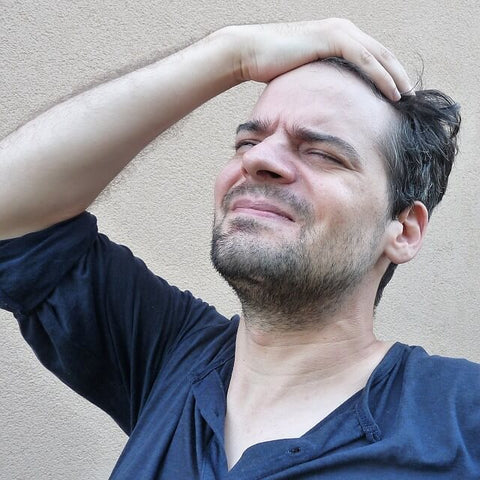 How to prevent hair loss caused by stress?
How to prevent hair loss caused by stress?
The most essential thing to do is to reduce emotional & physical stress and tension levels. To reduce stress levels, get enough sleep (as your body focuses less on other problems, it can return its attention to hair growth.) and do more stress relief exercises (when it comes to hair loss caused by stress, all forms of exercise can help ease anxiety and depressed mood by helping the brain release endorphins).
Besides that, follow a healthy diet (Eating healthily gives your body more energy, enabling it to better cope with stress. Even if hair loss is not the result of a nutrient deficiency, a proper diet will still enhance future hair production and recovery), breath deeply if you feel worked up (the practice of deep breathing can help in reducing the extra stress factory and restore hormonal balance), and visit a therapist.
Conclusion: With relaxe techniques and better nutrition, you can expect hair growth to return to normal after a period of three or four months.
Hair Fall due to the side effects of certain medications:
 Some medications, such as Anticoagulants (blood thinners), gout medications, beta blockers, angiotensin-converting enzyme inhibitors, male hormones, antidepressants, can contribute to hair loss in men.
Some medications, such as Anticoagulants (blood thinners), gout medications, beta blockers, angiotensin-converting enzyme inhibitors, male hormones, antidepressants, can contribute to hair loss in men.
Even though quite a few medications can cause hair to fall out, the good news is that in most cases, this form of hair loss is usually temporary, and it’s reversible once you stop taking the drug or speak to the doctor about lowering dosage or switching to another type of medication (if it seems to be a common hair loss cause, ask if you can have an alternative drug). If your hair does not grow back within a few months of stopping the drug, then see your doctor to discuss the possibility of further medication to prevent hair loss.
Hair Fall due to genetics
Hereditary hair loss (also known as androgenic alopecia,or male pattern baldness) affects millions of men across the world, being one of the most common causes of hair loss. Androgenic alopecia is the outcome of both genetic and hormonal factors. The ongoing treatment of androgenic alopecia involves stopping the progression of hair thinning or keep it from progressing too quickly.
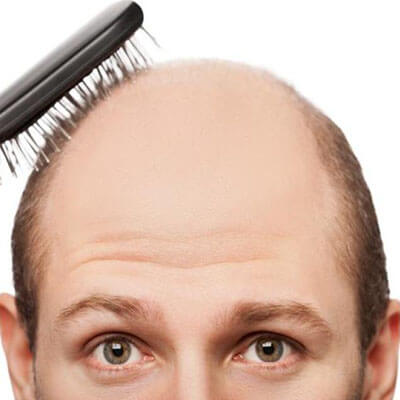 Here’s how to fight hereditary hair loss!
Here’s how to fight hereditary hair loss!
◆ Diet: Clearly, protein, vitamins B6, B12, and folic acid are important to your hair. eating the right amount of vitamin A and making sure you eat enough protein and iron is key to healthier hair. Though a healthy diet (eating well and being properly nourished) probably won’t cure your hereditary hair loss, it will offer as much nourishment to the existing hair as possible.
◆ Hair care: Be gentle with your hair. Don’t subject it to endless backcombing which can result in an irritated scalp. And an irritated scalp won’t produce healthy hair.
◆ Medications. Patients may opt for FDA accredited medications, which include Minoxidil and Finasteride. Although both may show positive results, they may not be effective for everyone.
Hair Loss due to several health conditions
Several health conditions, including thyroid disease and iron deficiency anemia, can cause hair loss.
◆ Thyroid: Every part of the body requires thyroid hormone for proper functioning, and that includes the hair follicles. The noticeable hair loss is a red flag for men to get to the doctor for thyroid testing because underactive and overactive thyroid can lead to hair loss. To reduce hair loss due to thyroid disease, optimal thyroid treatment should be taken. It can be reversed with proper treatment. There are many different thyroid medication options. Finding a doctor open the treatment options to find what is right for you is key.
◆ Iron deficiency: Iron is required for proper hair growth and may be the main causes of hair loss in patients with hypothyroidism and Hashimoto's thyroiditis. Anyone with hair loss and taking PPI’s or acid-suppressing medications should immediately get their ferritin levels checked. Hair fall due to iron deficiency can be corrected by increasing iron intake, restoring iron levels and thereby hair growth!
How to Grow New Hair after Hair Loss?
There are various hair growth products on the global market--click here to learn more information on 4 Hair Growth Solutions for Hair Loss. In this article, ReHair® Laser will detail “Hair Transplant” and “Laser Therapy” as the first 2 effective methods widely adopted by people who are suffering hair loss and eager for new hair growth.
Hair Transplant
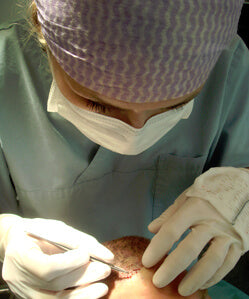 For many people, hair transplant - one of the most effective hair loss treatment, can truly “re-grow” hair, and help bring back what looks like a full head of hair. Many men turn to hair transplants after tried other hair growth products with no success, therefore it seems that hair transplants for men are the most common and effective hair restoration procedure.
For many people, hair transplant - one of the most effective hair loss treatment, can truly “re-grow” hair, and help bring back what looks like a full head of hair. Many men turn to hair transplants after tried other hair growth products with no success, therefore it seems that hair transplants for men are the most common and effective hair restoration procedure.
The two most common transplantation techniques are follicular unit extraction (FUE) and follicular unit transplantation (FUT). A “transplant” involves moving the hair from the back and sides of the head and then relocating it to the front of the head where balding occurs. e.g, with FUT hair transplant, the follicular units are harvested from a strip of scalp that is removed by the surgeon from the back of the head.
Hair transplants can produce dramatic, long lasting results, However, they cost a lot and require invasive surgery and needs to take place in multiple stages which makes it very time consuming. The side effects like hair fall for a short time after the surgery following the traumatic effect on the scalp, may reduce a bit of your already decaying hair, and the surgical procedure can cause infected hair follicles. Although it rarely happens, the infection can lead to other physical problems for which you need to consult with a doctor.
ReHair® Laser recommends that men considering hair transplants meet with an experienced clinic specializing in hair loss issues – and avoid places that use salesmen instead of physicians to tout their procedures.
Low Lever Laser Therapy (LLLT)
There is a highly effective therapy called low level laser therapy (LLLT) that both reduces hair loss and enhances hair growth. LLLT is a painless therapy that requires minimal time commitment, and it has been scientifically proven to be both safe and highly effective for hair restoration.
Learn more information on What is Low Level Laser Therapy (LLLT)?
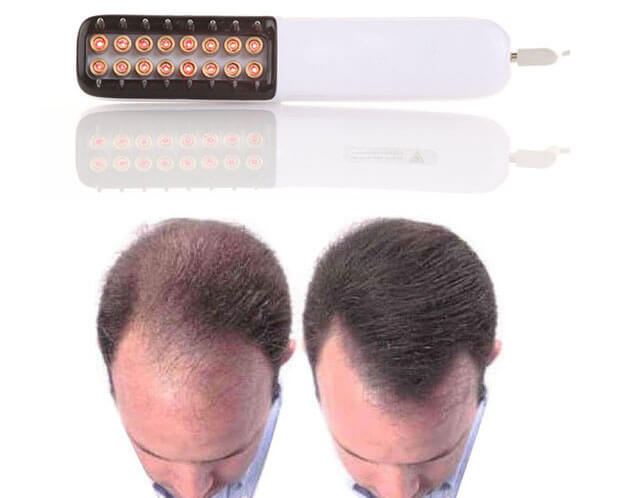
Low level laser devices (laser cap, laser comb, and laser helmet) approved by the FDA are promoted for use in male pattern hair loss. The laser devices used are referred to as cold lasers as they produce little heat and are safe to use and will cause no damage to the skin or hair follicles. Studies show that 80 percent of people treated with lasers for hair loss have a decrease in shedding or complete stopping of hair loss, and 40 percent get thicker hair.
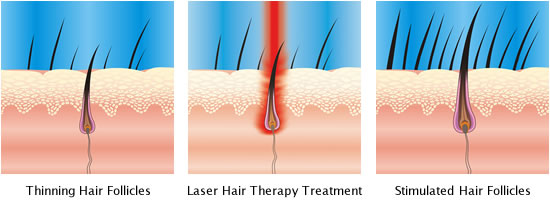
Besides that, it is reported that LLLT has been widely adopted as a productive complement to hair restoration surgeries for improved hair transplant results. After a hair transplant procedure, LLLT draws blood, oxygen, and nutrients to balding areas, promoting stronger effects. Since hair loss is a progressive, long-term condition, undergoing long-term treatment after a hair restoration surgery can limit additional thinning as well.
Click to read more information on Laser Hair Regrowth Treatment: Best Devices and Cost
Conclusion
Hair thinning and moderate hair loss can be treated by the Low-Level Laser Light Therapy. You may also require a hair transplant in case suffering from extensive hair loss or baldness. The most important thing under all circumstances is that almost all hair growth products work best for patients at an early stage of hair loss.

